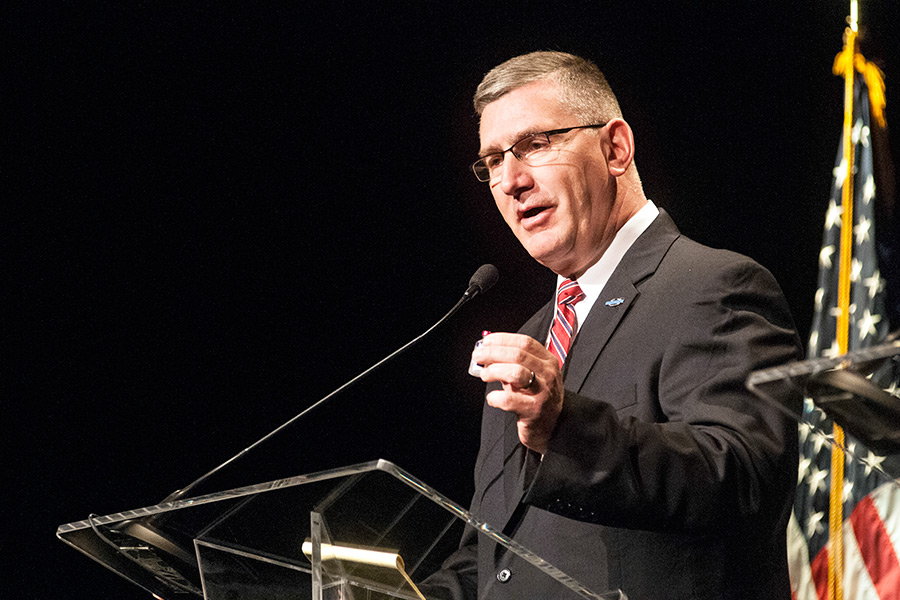Democratic prospects for winning the U.S. Senate seat were tenuous even before a plagiarism scandal broadsided U.S. Sen. John Walsh, forcing him to withdraw from the high-profile election and clearing a path to victory for the Republican candidate, U.S. Rep. Steve Daines.
Now, facing an 11th-hour push to nominate a replacement, the party is hamstrung by a narrow field of viable candidates and an even narrower timeframe for a nominee to raise money and gain momentum on the campaign trail. And with no Democratic opponent, Daines is poised to become the first Republican to win the Senate seat in a century.
But there is more at stake for Montana Democrats than the Senate seat, and jettisoning Walsh from the picture allows the party three months to shift the public’s focus from the distraction that eclipsed Walsh’s candidacy to other Democratic hopefuls – namely, House candidate John Lewis and a suite of potential state legislators with a strong chance of winning.
“In terms of swinging the Senate race it probably isn’t going to make any difference. It was already such a tall task,” Robert Saldin, an associate professor of political science at the University of Montana, said. “But when you take into consideration the House seat and the state Legislature, it is kind of a game changer.”
Montana Democratic Party officials have scheduled a special nominating convention Aug. 16 in Helena, where they will select a replacement candidate for Walsh in the U.S. Senate race.
The convention will start at 9 a.m. at the Lewis and Clark County Fairgrounds, and will include leaders from county party committees, federal and statewide elected officials and the party’s executive board. Party spokesman Bryan Watt says the intent is to have a candidate nominated by the end of the day.
A new candidate must be selected before Aug. 20 to run against Daines and Libertarian Roger Roots.
But Saldin said it matters less who the Democrats select than that they dispatch the process quickly.
“The sooner the better to start with a clean slate and move on in a positive direction. It’s about more than just this Senate seat at this point, so the quicker they can cut their losses and move on the better,” he said. “In some ways I think this could be a really healthy thing for the Democratic Party. It takes all the attention away from what had become a really embarrassing situation that was gaining all the attention and I think Democrats were worried it would have a trickle-down effect all the way down the ballot. Now they can start focusing on what they really want to be talking about this election cycle, and plagiarism wasn’t what then wanted to be talking about.”
Democrats optimistic they’d found a viable candidate in Walsh had their hopes dashed by a plagiarism scandal involving the appointed senator’s final paper to obtain his master’s degree from the U.S. Army War College.
Although he initially pledged to stay in the race, Walsh bowed out Aug. 7, two weeks after a withering New York Times report accused the former National Guardsman of appropriating lengthy passages from several sources available online, most notably a 2002 report by the Carnegie Endowment for International Peace.
Although the revelation came months before an election in which the Democratic appointee was attempting to defend his seat, the story filled a vacuum in the political news sphere and, after repeated attempts by the Walsh campaign to soften its blow, signaled a death knell for the campaign.
Walsh, who previously served as lieutenant governor to Gov. Steve Bullock, was appointed to the senate seat after Democrat Max Baucus was nominated as the ambassador to China. Baucus had already announced his retirement, and the diplomatic nomination meant Bullock needed to appoint a successor, which he found in Walsh, who was already running against Daines.
The appointment excited some Democrats who saw a strong candidate in Walsh, his military credentials and dearth of political experience a boon in an independent state like Montana.
Still, Saldin and other political observers say Walsh had a slim chance from the get-go, describing this election cycle as a challenge for any Democrat.
“It’s not just that he was running against a formidable candidate, but it’s also a bad year for Demcorats,” Saldin said. “It’s a mid-term election, which is historically beneficial for Republicans, and it’s on the tail end of an unpopular president. This is just a really hard time to be running when you are from the same party as the president. Republicans faced the same challenge at end of the Bush years.”
Although the names of several power-candidates had been bandied about Democratic circles – most prominently former Gov. Brian Schweitzer, who has said he’s not interested in running – Saldin said it’s smarter to select a candidate who will run a respectable and antiseptic campaign rather than someone bombastic, who is more likely to create additional distractions.
“What the Democrats need to be thinking about is trying to put all this unpleasantness behind them and find someone who is going to be an honorable standard-bearer,” he said. “If they can find a candidate who can run a good, clean race they should be very happy with that.”
